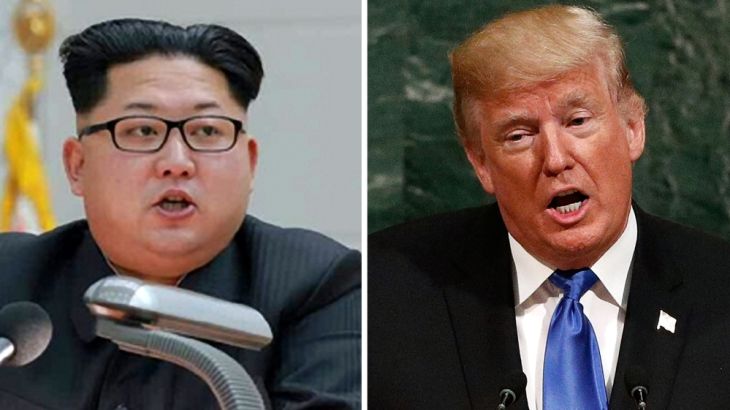
Is the Trump-Kim summit a lost cause?
As US President Donald Trump cancels much-awaited talks with North Korea’s Kim Jong-un, we look at the regional impact.
It would have been the first time a sitting US president met a North Korean leader.
But US President Donald Trump has pulled out of his highly anticipated meeting with North Korean leader Kim Jong-un next month – a move that Pyongyang has called “extremely regrettable”.
Keep reading
list of 4 itemsA flash flood and a quiet sale highlight India’s Sikkim’s hydro problems
Why is Germany maintaining economic ties with China?
Behind India’s Manipur conflict: A tale of drugs, armed groups and politics
Trump’s announcement, in the form of a “break-up” letter, came just after North Korea said it had blown up its only nuclear test site in a goodwill gesture to reduce regional tensions.
So what does the cancellation of the Trump-Kim summit in Singapore mean for the region?
According to Deborah Elms, executive director of the Singapore-based Asia Trade Centre, “It was always questionable whether the summit would take place … but it’s still possible a summit will take place in the future.”
“At some point, you’d like to think that North Korea would be out of the pariah status and back into the global community,” says Elms.
“When that will take place is a little unclear … but there are some real challenges in getting that done, and the more the US side, in particular, talked about the Libya example, the harder it is to get North Korean elites to go along with the strategy. Because in their minds, the Libya example is either death or prison, and neither one of those outcomes sounds particularly attractive.”
Elms explains that “the use of the term ‘Libya’ and repeated discussions about unilateral disarmament are very difficult kind of language to use before you’ve even had the opportunity to sit down and meet for the first time. And when you’ve set that up as the initial goal, it’s even harder to get the North Koreans to come to the table.”
“What you saw was increasing North Korean anger leading the US to cancel the summit … you’ve got two sides who are both disruptive-type leaders and it’s difficult to get two disruptive-type leaders to get together when they’ve never met before and when they both practise a certain kind of diplomacy that’s about bomb-this, and threats, and its hard to see how those two kinds of leaders can get together in a peaceful summit kind of fashion.”
When asked about China‘s reaction to Trump’s cancellation of the summit, Elms says, “the Chinese are probably ok with the summit being cancelled because …. the Chinese were not the cause of the cancellation. They cannot be held accountable … They did what they could to get the Koreans to agree to go to the summit. The US called off the summit, so the Chinese probably feel they’ve done what they can.”
According to her, the South Koreans are the most unhappy about the collapse of the summit. She says they were “really excited about the possibility of finally ending the threat of nuclear war on their border, very enthusiastic about a different approach … So, to find out that the summit was cancelled … has got to be incredibly disappointing … So, South Koreans have got to be saying to themselves: What else can we do? How else can we solve this? How reliable a partner is the US now? It puts them in a very awkward position.”
Also on this episode of Counting the Cost:
Italy-Europe relations: As Italy puts the finishing touches on its new coalition government, there’s growing concern in the European Union over its eurosceptic stance. Many are focusing on the prospects of Europe’s third-largest economy at the hands of a big-spending coalition government, as Laurence Lee reports from Ciampino. And Lyn Graham-Taylor, senior rates strategist at Rabobank, discusses Italy’s collision course with Europe and the budget deficit.
Oil prices on the rise: Oil is currently trading at a nearly three-year high. Conflicts in the Middle East and the 2015 Iran nuclear accord break-up have pushed up the price because of potential global supply risks. To add to this, the Organisation of the Petroleum Exporting Countries (OPEC) and its allied nations have been curbing output since the start of last year.
So how worried should consumers feel? Or is it now time to accept whatever the market dictates? Professor Giacomo Luciani from Geneva’s Graduate Institute offers his take.
GDPR: The big EU legislation on data protection, GDPR, is now in effect. Businesses now need to ask for consumer’s consent to harvest data. So, people will have to actively opt-in and consumers have the right to know if their information is being used and for what purpose. Companies in breach of GDPR can be fined up to four percent of annual global turnover.
France tech summit: French President Emmanuel Macron has called for more openness and honesty from technology companies. Facebook‘s boss, Mark Zuckerberg and other industry chief executives attended a summit in Paris, along with political leaders. Macron told executives from the world’s biggest technology firms that he believed in innovation but that he wanted tougher regulations and for them to contribute more to society.
Sony to buy EMI: Sony is set to buy a controlling stake in EMI Music Publishing for $2.3bn, in hopes of strengthening its music portfolio. The deal will see it get a catalogue of more than two million songs. The 60 percent stake in EMI is part of Sony’s growth plan built around content and streaming services. The deal still needs approval from the regulators.
Malaysia probe: Police in Malaysia have seized nearly $30m from apartments linked to the family of former Prime Minister Najib Razak. Najib’s been accused of pocketing millions of dollars of public money, including from state fund 1MDB which he set up in 2009. He denies any wrongdoing.